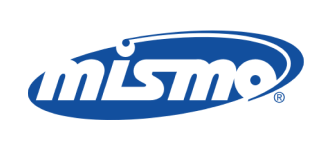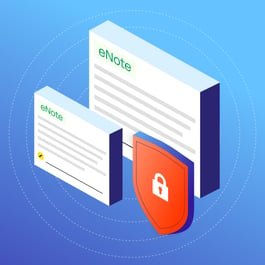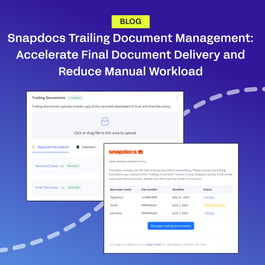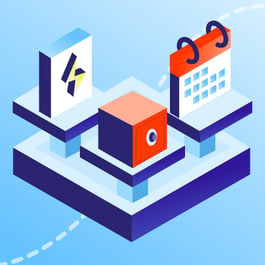Welcome to Mortgage Industry Trailblazers, our ongoing interview series with innovative, forward-thinking professionals in the mortgage industry, hosted by Camelia Martin, Snapdocs’ Head of Industry and Regulatory Affairs. The series will take a look at the problems and solutions the industry is facing, through the eyes of some of its top leaders.
Raj Penugonda isn’t your average Trailblazer. Yes, he’s a veteran in the industry, and has been a leader and innovator at some of the industry’s biggest lenders, including Wells Fargo and Bank of America. What sets Raj apart from other Trailblazers, however, are his tools of the trade – knowledge and education. In his role as Director of Product Development at Freddie Mac, Raj is an evangelist for change.
He’s a fierce advocate for eMortgage adoption whose job requires him to partner with stakeholders from every corner of the mortgage industry to create products and policies to modernize processes across every step of a mortgage’s lifecycle.
He’s been instrumental in pushing Freddie Mac and its lender partners into the future by relentlessly advocating for adoption of eMortgages. We sat down with Raj to discuss how the industry can continue its evolution toward digital processes, and why education is so instrumental in making that happen.
Camelia Martin: Thank you so much for joining us, Raj. I’d love to hear firsthand how you describe your role as Director of Product Development at Freddie Mac.
Raj Penugonda: First of all, Camelia, I just want to say that I'm blessed to be part of the eMortgage growth journey, right? I look at my role as an eMortgage evangelist. I know a lot of people use that term "evangelist," so I don't use that word lightly. If I look at my role on a day to day basis, I'm talking to different stakeholders: lenders, technology, partners, warehouse providers, servicers, and also internal legal and technology partners. I’m trying to work with all of these stakeholders to work toward a single goal: promoting the adoption of eMortgages in the industry. That's really how I look at my role.
I'm really grateful for this opportunity to be part of Freddie Mac's eMortgage program and try to work with people like you to move the industry forward.
Camelia Martin: I really like how you describe your role. eMortgage is such an evolving space with layers of complexity. There's legal, there's operational, there's technical – always something new to learn and another rabbit hole to go down. Never a dull moment for sure.
Raj Penugonda: Yeah. Recently, there has been a lot of discussion about Remote Online Notarization (RON) audio/video storage requirements that Freddie Mac and Fannie Mae came up with last year. As part of the research in trying to address the operational complexity related to this requirement, working with our lawyers, I became acquainted with various state laws about the sole custody and control requirement that some states have to figure out what they really mean. Our legal team that supports the eMortgage program is terrific and they helped me in this process. The research also entailed talking to technology providers about how they're addressing that requirement. Understanding their processes and incorporating those elements into what potentially could be in a new policy from Freddie Mac pushed me to really get into that legal mindset while also talking to technology partners to understand their current structures and then talking to lenders to see how they're dealing with this process.
So, just one issue resolution required me to wear multiple hats. When I talk to lenders, I need to understand their operational process from an organizational process perspective. When I talk to technology, it gets into contractual matters and technology processes. Legal language is always written in a very different manner. Reading that and working with my legal partners closely to determine potential policy changes. That's what makes my role very interesting, and that's what I'm really grateful for.
Camelia Martin: So there are days you have your business hat on, your operational hat on, your policy/legal hat on. That’s very interesting. I like how you describe these policy decisions that you're influencing and that Freddie Mac is considering – you're not making them in a vacuum. You're taking the time to understand the practical impact of that policy, the legal underpinnings, and the capabilities of the different participants that are going to have to accommodate and make sure that they're complying with it.
Raj Penugonda: Yes, talking to the National Notary Association, the American Land Title Association – all of this is really part of my job.
Camelia Martin: You've been at Freddie Mac for eight years, and the vast majority of that time has been focused on eMortgage initiatives. If you think back to when you first started in this role, how would you describe this progress that the industry has made towards adopting eMortgages?
Raj Penugonda: The one-word answer is: phenomenal. Phenomenal progress, right? When I joined the company back in 2013, Freddie Mac had two sellers delivering eMortgages to us. Soon after, one of those lenders decided to turn off their eMortgage programs due to a document platform transition. That means I was working with just one customer in 2014 and a good part of 2015. Today, we have more than 120 lenders that have been integrated with the MERS Registry. The progress industry has made has been phenomenal.
What we realized quickly around 2013-14 is that it's really a question of the ecosystem. For an originator to be successful in originating new mortgages, they need a lot of supporting partners to also embrace the process – warehouse lenders, servicers, servicing agents, technology partners, document custodians. We quickly realized this is an ecosystem problem, and we started working on helping manage the parts that we can. For example, to address the issue of lack of document custodians for eNote, we stepped into a temporary role of eNote custodian by standing up an eVault and implementing an industry first automated certification process in 2015. We thought we could at least solve for that part of the ecosystem.. Then we, fortunately, received an FHFA (Federal Housing Finance Agency) directive in 2016 that enabled the GSEs work with industry stakeholders to address eMortgage adoption barriers.
The amount of outreach we were able to do through joint GSE efforts with various stakeholders – including MBA, MISMO, MERS – led us to a state where the industry was constantly talking about the eMortgage process, trying to come up with different solutions, some of which required Freddie Mac to get creative.
eMortgage warehouse lender agreement simplification is a good example of how Freddie Mac simplified operational complexity for the industry. At that time, an eMortgage triparty agreement was required between a lender, warehouse lender and Freddie Mac. If a lender utilized, say, warehouse lines from two different warehouse lenders, they had to sign two separate tri-party agreements, one for each warehouse lender. And a warehouse lender had to sign one tri-party agreement for each lender for which it provided an eNote warehouse line. We incorporated the tri-party provisions in our Guide, which is part of the contract lenders sign to deliver loans to us, eliminating the need for lenders to sign separate eMortgage warehouse tri-party agreements. And we created a non-lender specific agreement for warehouse lenders that they have to sign one time, regardless of the number of Freddie Mac eMortgage lenders for which they provide eNote warehouse lines.
Camelia Martin: That ripple effect from those policy decisions I think is super interesting. For example, when we talk to lenders, one of the top benefits they always call out is speed to delivery and how they're benefiting from the auto certification capabilities. Not just from the operational efficiencies, but from the capital efficiency that eNotes and eMortgages provide.
Despite all of this progress, which I agree has been phenomenal, as an industry, we're still under double-digit percentage of total loans being closed as eMortgages.
What do you think it will take for us to get to that majority, that 50 percent or even just 25 percent of adoption?
Raj Penugonda: It’s a two-part solution. First, we need more lenders participating, which definitely is happening at a steady pace. Then, the lenders that participate in this space need to convert more of their business to an eMortgage business, which is also happening. So if you look at our top 10 producers today, they deliver anywhere from 15 to 30 percent of their overall production as eMortgages. Some of these top producers are delivering anywhere from 40 to 50 percent, even 80 percent in some cases, as eMortgage. There are some key enablers that should help more lenders to deliver such a high percentage of their business as eMortgages. Uniform adoption of remote online notarization (RON) processes across the country is one such enabler.
A federal law such as the SECURE Act with uniform standards for RON processes across the country will go a long way. Then the other thing that would help is the settlement community coming together. We are seeing that, during the pandemic, the settlement community embraced digital closings in a big way. That has to continue, and we need technology to help with that process. Right now, we hear settlement agents talk about getting a closing order, four or five hours ahead of the scheduled closing time and they need to scramble to tag those documents. Having technology that automatically tags these documents will go a long way -- in addition to having a better collaboration between lenders and settlement agents.
One thing we talk to lenders about all the time is that it's not just a technology implementation when it comes to eMortgage. It is an overall change management process where you need to engage all of those stakeholders and talk to them and work with them very closely. One of the key takeaways I got from talking to a lender recently is that they have established almost like a concierge model, where there is close collaboration between the closing department of that lender with the settlement agent and with the borrower and also the loan officer. They are there trying to make calls to these people, maybe sending emails, trying to make sure everybody fully understands their role and expectations within the closing process. That allows them to ramp up their eMortgage production from about 10 percent or so in the beginning of the year, to anywhere from 30 to 40 percent of their production.
Camelia Martin: When we've also talked to lenders that have been successful in their eMortgage adoption efforts, the one common denominator is certainly the fact that they invested in that business process reengineering, and in change management. Sometimes, yes, it's a business model that works in their favor for sure, but other times, it's the fact that they've taken the time to really make sure they can optimize and maximize the number of loans that can be done as eMortgages. That requires cooperation with the loan officer, the closing team, the settlement agent, etc.
Regarding something else that you said. I totally agree that Freddie Mac has some of the most progressive eMortgage policies, but in a vacuum, I don't think that's enough when we still have some variability across partners, like aggregators, servicers, subservicers and warehouse lenders. To really move the needle forward, they can’t just be willing to accept eMortgages or participate in this ecosystem, but we need to think about how we can normalize and calibrate some of these policies, so that there's some uniformity. Hopefully, and I think this is often the case, they're modeling those policies after Freddie Mac and the GSEs, so maybe we'll continue to see some of this collaboration in line with that participation.
Raj Penugonda: You make a great point about aggregators. There are a lot of lenders that do not directly sell to Freddie Mac, but sell to aggregators who in turn sell to Freddie Mac. Some of the things I talked about such as uniform RON policy across all states would go a long way in making aggregators comfortable in accepting more eMortgages from their correspondents, for example. That's just one piece of it.
In terms of the technology, things like automatic tagging are just one piece of the overall puzzle. We need to think about how technology can let a lender know if a loan is eligible for eClosing and which loan documents can be e-signed, based on factors such as loan product, subject property location, investor execution etc. Lenders should not be left to manually figure this out on a loan by loan basis, as that would make the process unscalable.Having technology that determines those things on behalf of the lender would go a long way.
From a culture standpoint, lenders should make “e” as the default and then give borrowers the choice to opt out if they want to. That makes the operational process simpler, as opposed to leaving it to their branches, their operations team, to decide on a loan level basis. This can lead to some variability in terms of offering eClosings on each loan, and that in turn impacts the percentages we talked about.
Camelia Martin: Absolutely. Snapdocs emphasizes the importance of – we call it "e-Eligibility" – helping lenders that automate those decisions upfront to take the guesswork out of it. We always say digital closings should not be more work. They should be easier. If I'm a lender and I'm not sure about a certain policy or whether I can close a loan in a certain way, the natural human behavior is to default to the more conservative approach, because that's what we know.
You called yourself an eMortgage evangelist at the very beginning of our discussion and you're clearly educating the market about the benefits of eMortgages. This is something that Snapdocs invests pretty heavily in – it's baked into our onboarding and our implementation, and it's something we continue to provide throughout our relationships with lenders. We firmly believe it's one of the keys to unlocking that broader adoption. But, Freddie Mac also champions eMortgage education in the industry. You have so many great web resources available on Freddie Mac’s eMortgage website, I've heard you speak on numerous panels and webinars, and you've presented on panels that Snapdocs has hosted. How important is educating the industry on this topic?
Raj Penugonda: I cannot emphasize enough how important it is. I'm fortunate to be part of some of the Snapdocs panels and also share the panel with you in the past. It feels like you and I are talking in so many different forums about the same thing. Sometimes I think, “Am I saying the same thing again? Am I being repetitive?” Then you attend some discussions and then you hear the same concerns again, "Hey, my legal team thinks eNotes are not enforceable" and I know that I'm not wasting my time. Education is the key.
People need to be aware of how eMortgages work. Recently, I was talking to a customer who has been delivering us eMortgages for some time and they said that one of the things they do to promote eMortgages within their organization is to go out and hold several educational sessions across the company. Even within a company that already uses eMortgages, it has a champion going around the country and talking about it to others in the company. Educating them on the benefits, the operational process, or any other aspect of the overall process.
Things like that go a long way in building a great culture within a lending organization. The executives can make a decision to move forward, but they have to generate interest and make people aware of how efficient this process is. In addition, there is still some misinformation out there. People think there are places that you can’t do eNotes, or that they’re not enforceable. We need to get rid of some of those very fundamental misconceptions that are out there through educational efforts.
Camelia Martin: Totally agree. It's obvious from this interview, that your work at Freddie Mac perfectly demonstrates what it means to be a mortgage industry trailblazer. I know there's countless lenders and other mortgage industry participants, but you've helped ease this transition to eMortgages by sharing what you know – by educating and by offering support. If I'm a lender that's reading this interview or listening to this interview, and I'm ready to implement eClosings but maybe I don't know where to start, what’s one piece of advice would you make sure that they hear?
Raj Penugonda: Only one piece of advice?
Camelia Martin: I know that's hard. I'm asking you to narrow it down and you've got plenty to offer.
Raj Penugonda: I would say, start with hybrid eClosings that include electronic notes in one channel or one market, or one product. Start small, but definitely include eNotes because that is going to give you the biggest bang for the buck. You can expand it to other channels or markets or other products after that.
Camelia Martin: Great advice. You don't have to build it all in one day, you can start small. And eNotes are definitely where we see a tremendous amount of ROI and lift for lenders. Freddie Mac is a true leader in the eMortgage space because of trailblazers like you, Raj. On behalf of myself and the team at Snapdocs, thank you for taking the time to share your knowledge with us and the industry.
Raj Penugonda: Thank you, Camelia, it's an honor to be part of this discussion here. I appreciate the opportunity. Freddie Mac has a mission to help with home ownership in the country. We believe that eMortgages have a meaningful, positive impact on that goal by making the process more efficient while saving money for lenders and for consumers.




















